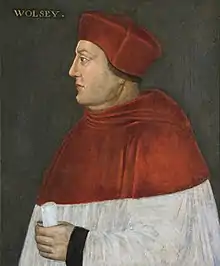
Thomas Wolsey (c. March 1473 – 29 November 1530) was an English political figure and a cardinal of the Roman Catholic Church. When Henry VIII became King of England in 1509, Wolsey became the King's almoner. Wolsey's affairs prospered, and by 1514 he had become the controlling figure in virtually all matters of state and extremely powerful within the Church. The highest political position he attained was Lord Chancellor, the King's chief adviser. In that position, he enjoyed great freedom and was often depicted as an alter rex (other king). He fell out of favour after failing to negotiate an annulment of Henry's marriage to Catherine of Aragon and was stripped of his government titles. He retreated to York to fulfil his ecclesiastical duties as Archbishop of York, a position he nominally held but had neglected during his years in government. He was recalled to London to answer to charges of treason—a common charge used by Henry against ministers who fell out of favour—but died en route of natural causes.
Quotes
- Master Kingston, I see the matter against me now it is framed; but if I had served God as diligently as I have done the King He would not have given me over in my gray hairs.
- To the messenger summoning him to see Henry VIII..
Disputed
- Be very, very careful what you put into that head, because you will never, ever get it out.
- Attributed to Cardinal Wolsey by columnist George Will, a line that he says was "uttered about Henry VIII", as quoted in William A. Henry In Defense of Elitism (Anchor Books, 1995), p. 45.
- Begot by butchers, but by bishops bred,
How high his Highness holds his haughty head!- Attributed to Cardinal Wolsey in English Etymology; Or, a Derivative Dictionary of the English Language (1783) by George William Lemon, "Alliteration".
Quotes about Thomas Wolsey
- Wolsey turned out to be the most disappointing man who ever held great power in England and used it for so long with skill and high intelligence... His foreign policy, often brilliant and never negligible, had resulted in the isolation of England, the enmity of both Spain and France, and the king's failure to get his divorce; it had been based on a false estimate of English power and directed consistently to ends in which England had little interest. The administration, badly in need of reform, was on the contrary more confused than before; the reserves of treasure were gone, prosperity was declining, trade neglected. The Church, his special charge, Wolsey left in an unprecedented state of weakness... Only in the law he had done things that bore fruit, and much though he liked the work of a judge he would surely have been dissatisfied with a verdict that allowed him but this piece of success. And yet it is hard to see what else one can say. Embodying in himself the link with Rome and the height of the medieval polity, he pulled them down in his fall; his death marks the close of the older order with as much definition as any man's fate ever marks the fate of nations.
- Geoffrey Elton, England Under the Tudors (3rd ed. 1991), pp. 121-122
- The Royal Navy was Henry's creation, and it saved both himself and his daughter after him when they adopted an island policy and defied the Catholic powers of Europe. Wolsey had no notion of the importance of sea power to England. He was a great medieval churchman, a civil servant of the old school, and a diplomatist of the Renaissance type. But of the future development of England at home and on the sea Wolsey had no vision at all. His master, with that curious instinct of oneness with the English people which was the secret of Tudor greatness, saw deeper. He could use Wolsey's consummate administrative powers during the years of his own apprenticeship in statecraft, and then pass over him along a path of his own which no Cardinal could be expected to tread.
- G. M. Trevelyan, Illustrated History of England (1926; 1956), pp. 296-297